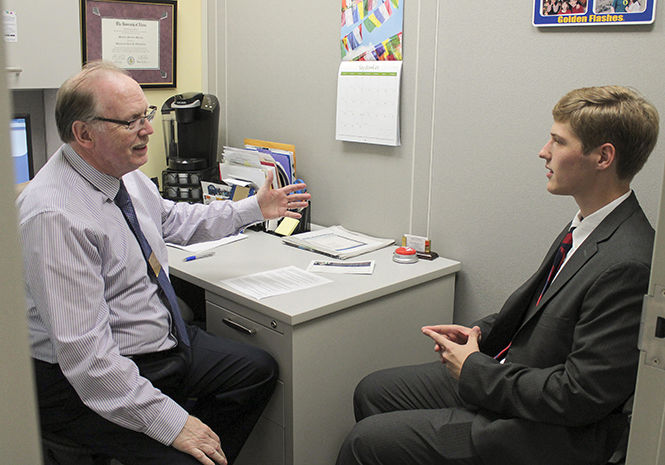‘Fake it until you make it’? Well, at least to a point
Andrew Bastian, sophomore accounting major practices his interviews skills during a mock interview with College of Business career advisor Mike Morley during the Business Kickoff event. The interview station was the third of four stations available for students to particpate at.
March 31, 2015
Here’s a scenario: You’re interviewing for a top-notch marketing firm in your best, pressed suit, shoes polished, tapping the floor with anxiety. The interviewer dishes out that question that, you know yourself, goes beyond your capability of answering. Effectively, that is.
Question is: Do you lie?
In the cutthroat world of accumulating internships and entry-level jobs, the face-to-face interview is, for those who have run the gamut, an inescapable evaluation of one’s traits and demeanor, of whether he or she can create weekly budgets, code HTML, simply be a Twitter novice — or the classic “social media expert.”
But the drilling of one’s skills and abilities goes hand-in-hand with something as basic as how straight your posture is, the position of your lapel or the neatness one’s hair is kept in a bun. Communication, according to career experts, is as nonverbal as it is spoken.
And psychologists have this covered.
In 2011, Amy Cuddy, a Harvard social psychologist, published a paper that detailed the do’s and don’ts in a professional tête-à-tête. In “Preparatory Power Posing And Job Interview Performance,” Cuddy suggests that if one lacks likable pep or a business-friendly panache, he or she could act like such for the same effect. Sitting up tall, ensuring eye contact, stretching like an Olympian — acting “dominant,” she said, can lead to behaving in such a way. According to her research, it even increases testosterone levels. Be careful with that one, gents.
And Cuddy went even further. She observed the behavior of chimpanzees, especially in the one-on-one scenario, where dominance played a key in communication. She found the most persuasive — the “high status” chimps, she calls them — were those that had their chests raised, backs straight as a tower.
“Those that pounded their chests,” she wrote, were the most victorious — although it’s probably not the best idea to go full-chimp halfway through an interview.
What is important, Cuddy wrote, is the mindset itself, what psychologists have known for centuries pairs with behavior. William James, physician and the American “Sigmund Freud,” once denounced the idea that our behavior is a direct result of our mood.
“But actually,” he said, “action and feeling go together; By regulating the action, we can indirectly regulate the feeling.”
To put it simply: Act like a boss, you’ll feel like a boss — and hopefully become one eventually.
For students in the College of Business Administration, any advice from a sought adviser tends to follow this psychological trend. An “Interview Preparation” handout picked up from the Career Services Office is lined with commandments from “Be aware of your posture and body language” to “Shake hands firmly, but don’t squeeze” and the almost-obvious “Do not slouch or take a nap.” (Hopefully the HR rep isn’t that boring.) The general idea, however, is all encompassing: Show that you’re confident and determined, at least for those 15 minutes.
Yet, a line must be drawn somewhere.
Feigning a happy-go-lucky smile is one thing; telling employers you are fluent in Spanish or know American Sign Language, when you don’t, is another. Lying about certain expertise or knowledge would be, for business officials, no bueno.
“You’ll come across as deceitful and disingenuous,” said Entrepreneur writer Steve Tobak. “You’ll likely make big mistakes, shoot yourself in the foot and self-destruct.”
Tobak labels those with clear delusions of grandeur having a sort of “imposter syndrome,” the same tendencies as a con artist. The most extreme cases can mean big jail time.
In 2010, Harvard student Adam B. Wheeler was convicted of more than 20 accounts of larceny and identity theft after fooling prospective employers into believing he had scholarships to MIT, co-authored books published by Princeton and even claimed to have given a lecture to the National Association of Armenian Studies under the sort-of-awesome title “Black Milk and Stairway to Heaven.” The press dubbed him the “Ivy League Imposter.”
A year before his Harvard graduation, authorities caught onto Wheeler’s pathological conning, and his gig was up. He was instantly banned from Harvard’s premises, sentenced to one year of prison and fined the $45,000 that he duped Harvard out of. After a month-long psychiatric investigation, Wheeler wasn’t found mentally ill, according to The Harvard Crimson in 2011, just simply “dishonest.”
Fibbing to the extreme aside, there are precautions Cuddy advises through her findings, mostly stemming from what’s not communicated verbally. Over-exercising the “power poses” she prescribes could lead to a potential backlash if one’s not too careful.
“Mimicking the dominant nonverbal behavior of the other person,” she wrote in her article, could mean a clash of who’s in charge and who’s getting the job. Knowing when to assert one’s self and when to back off, she announced in her 2011 TED Talk, is exactly what got her into Harvard in the first place.
Choosing to rep your shining, alpha persona is up to yourself.
“But it’s a risky strategy,” Cuddy admits, “and things can go wrong.”
“Fake it until you make it” may not be key to winning over that supervisor at 3M or managing editor at Cosmopolitan, especially when it comes to displaying your true knowledge. Still, for a confidence boost, it’s meant to keep your chin up. And if things go right, in due time, you’ll no longer need to “fake it” anymore. By then, you just “are.”
Contact Mark Oprea at [email protected].

























